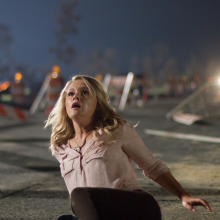Left Behind

Tim LaHaye. Image via Evangelical Press Association / RNS
Tim LaHaye, the evangelical leader known for his conservative politics as well as the best-selling Left Behind series, has died at age 90, his ministry announced.
LaHaye died July 25 at a hospital in the San Diego area after recently suffering a stroke, his ministry said.
Fear is in the air.
Ebola. War. Conflict. Economic turmoil. Political victories. Political losses. This is the stuff of the nightly news. And everywhere we look we have a new villain to worry about, a new threat against which we ought to brace, a new sense of hopelessness.
This is nothing new, of course. The world has always been a scary place. If anything, we have become inured to the greatest threats we might face. With roofs over our heads and weather forecasters to warn us of impending storms and economic structures to cushion us from financial catastrophe, we keep many dangers at bay.
And yet in the midst of so much safety and comfort, we seem to search compulsively for something to fear, something to raise our ire, something that will keep us up at night. It is not enough to feel safe apparently; for some reason, fear is too tempting.
Anytime these world disasters emerge — whether disease or storm or war or financial crash — some Christian or another will step to the microphone to declare the end of days. Things have never been this bad before. The global crisis is unprecedented. This can only mean the dawn of the end as we know it.
Then again, the same could have been said in the days when the plague was ravaging Western Europe. The same could have been said by the victims of Western expansion in the Americas. The same could have been said by our grandmothers and grandfathers as the economic system crumbled before their eyes in the Great Depression. The same could have been said by a Jew facing the Holocaust. The same could have been said by the Nigerian girls who were stolen for the sake of a deluded ideology.
Disasters are not new. Recent disasters do not erase old ones. And old ones do not discount new ones.
LEFT BEHIND may be a soft target, but once seen, you may realize that it’s a soft target for anyone who has ever been on an airplane, seen what Nicolas Cage is capable of in Leaving Las Vegas, met a Muslim, or not been cryogenically frozen since the era when it was socially acceptable to treat people with dwarfism as punchlines.
It really is worse than most theatrically released movies—shot and edited like a political attack ad/music video mashup, written like a child’s Sunday school lesson, and then strangely denuded of almost anything that would make it identifiably Christian (teasing those who already believe, yet scared of alienating people who just want to see a cheesy disaster movie without heavy proselytization).
The people who made it aren’t bad people, of course. (I’m not sure anyone is, with the line between good and evil running through each human heart and all—although that’s another argument that wouldn’t make it into this film.) The producers are ideologically committed to advancing a message that they were indoctrinated into by an unthinking system—let’s call it the Christian Industrial Entertainment Complex. They’ve stumbled upon the money and basic skill to make movies. They think that what they’re doing is changing the world for the better, but that’s doubtful—it’s more likely just reinforcing the closed-set worldview of the CIEC’s pre-committed adherents. This isn’t new, so I’m not too concerned about one more example of bad art masquerading as religious experience.
I have just returned from South Korea where I did an academic lecture on premillennial dispensationalism at Hoseo University. My very basic overview of the five aspects of Premillennial Dispensationalism: tribulational views, millennial views, dispensational categories, the Darby system, and biblical interpretive perspectives created quite a stir amongst students and faculty, which only goes to prove the impact that premillennial dispensationalism has had on the Christian community worldwide. I chose this topic in honor of the recent reissuance of the Left Behind movie.
Since the movie came out on Oct. 3, there have been numerous blog responses. I point you to two in particular that reflect my own views on the details of the biblical text and its interpretation:
- Nobody Is Getting 'Left Behind' (Because the Rapture Is Never, Ever Going to Happen)
- Why ‘Left Behind’ should be... left behind
Given these interpretations of the theology found in the Left Behind series I would like to take the conversation to the next level.
What has not yet been said in any blog that I have read is that premillennial dispensationalism is an elitist theology.
Two new movies that aim to attract a faith-based crowd join a glut of biblical films for 2014, testing the limits of Hollywood’s appetite for religion.
The two films, “The Good Lie” and “Left Behind,” both opening Oct. 3, reflect two different filmmaking strategies: One is geared for a wider audience that could attract Christians, while the other produces a movie clearly made for the Christian base.
With a number of films targeting a faith audience this year, it’s unclear whether Hollywood is oversaturating the market with faith-based films — a revolutionary idea 10 years after Mel Gibson’s “The Passion of the Christ” shocked the industry by raking in $611.9 million worldwide.
“The Good Lie,” starring Reese Witherspoon helping four young “Lost Boys” from Sudan adjust to life in the U.S., has underlying faith themes. The refugees rely on their faith as they try to leave homeland strife behind, and Witherspoon’s character works closely with a faith-based agency to place refugees with families.
Editor’s Note: ‘Left Behind’ starring Nicolas Cage hits theaters nationwide on Friday, Oct. 3. The film is based on the wildly popular book series and movies of the same title, in which God raptures believers and leaves unbelievers behind to learn follow Jesus and defeat the Antichrist. So how’s the film reboot?
Sojourners Web editors called up a group of religion writers in D.C. to watch and review the movie together. We left with more questions than answers. Here’s our takeaway on all things ‘Left Behind’ — and a little Nic Cage.
Catherine Woodiwiss, Associate Web Editor, Sojourners: So first things first — why Left Behind again?
When the books were published [starting in 1995], there was a debate happening in Christianity over whether Hell was a real, physical place. And the original movies were produced in the context of 9/11 and the Iraq war. So you can look and say, okay, this was a time of questioning what some saw as fundamental beliefs, of war and terrorism. So the popularity of an end-times series makes some sense.
But why now? Why today?
Editor's Note: Spoilers ahead! You've been warned.
Over the past eight episodes of The Leftovers, HBO’s latest drama based on Tom Perrotta’s play of the same name, viewers have been treated to a case study in grief and faith in the midst of a life-changing event. Unlike the Left Behind series, which incorporated Christian triumphalism with terrible theology, The Leftovers examines the deeper human and spiritual issues of what would happen were two percent of the population to suddenly disappear. It is powerful and beautiful and really hard to watch (especially Episode Five). It asks the question: does life go on when your world is changed forever?
The show offers a variety of responses to the Sudden Departure of October 14: Kevin Garvey, the police chief who seems to be losing his mind after his wife leaves him for a cult and after his father needs to be committed; Nora Durst, who’s lost her entire family, so she keeps everything exactly as it was when the Sudden Departure occurred; Rev. Matt Jamison, Nora’s brother whose faith has been shaken because he was not taken; the town dogs who have become feral; and finally, the creepiest citizens of Mapleton, the Guilty Remnant, or the GR as they’re “affectionately” known.
This past week’s episode gave us a greater understanding of the GR. Although the nihilistic views of the Guilty Remnant are quite different from those of Christianity, I was struck by their powerful and strategic mission of witness. The cult was formed out of the recognition that everything changed on October 14 and that to pretend otherwise was foolish. The group, in their white clothes, their silence, their stripped-down existence, bears witness to the fact that they are living reminders of what happened. They are fundamentalists about their cause and willing to die for it — even if that death comes from their own hands.
Through my work with The Global Immersion Project, I have spent a significant amount of time over the years cultivating relationships among both Israelis and Palestinians as we partner together in cultivating a narrative of reconciliation. As is often the case when we approach a people or place with the hopes of being/bringing the needed change, I have been the one most changed by my friends and colleagues who reside in the Middle East. Behind so many of the subconscious stereotypes and prejudices I had acquired earlier in my life I began to experience the richness of friendship and brotherhood among people I had previously “known” only through the latest sound bite.
Something I have learned in the classroom of real life relationships with Jews, Christians, and Muslims in the Holy Land is that our theology in the West has direct implications for the everyday lives of those in the Middle East. Often ignoring the remarkable movements of peacemaking, reconciliation, and collaboration that are sprouting like mustard seeds of hope across the Holy Land, we often choose only to amplify of the violence, discord, and disintegration of the region.
Editor's Note: This post was originally a sermon in our monthly Sojourners chapel.
Friends, grace and peace to you from God our Father and the Lord Jesus Christ.
Around the time I started middle school, my church acquired a series of books called The Left Behind Series. These books chronicle the final days of earth as outlined in the book of Revelation and other apocalyptic biblical texts. I won’t offer any commentary on the theology of these books, or even their literary value, but, as a middle-schooler, they were fairly impressionable.
The entire series begins with a dramatic reinterpretation of the rapture. People are going about their daily lives — driving to work, flying airplanes, making breakfast — when all of a sudden, people who had been there just seconds before are gone. Simply vanished into thin air. Of course, chaos ensues, because who is driving the car? Flying the airplane? Tending the stove? The world they leave behind is shattered, broken, and chaotic! This seminal event — the rapture — shapes the rest of the series as those who have been “left behind” work to win the ultimate prize — a place in heaven where they are no longer left behind.
WHEN A COLLEAGUE told me Sojourners had received a review copy of the latest Thursday Next novel by Jasper Fforde, I was delighted—and confused. My delight came because I’m a huge fan of the series, whose protagonist Thursday lives in an alternate-reality U.K. and, in previous novels, has worked for Jurisfiction, the policing agency within fiction. My favorite scene was when, several novels back, she helped Great Expectations’ Miss Havisham moderate an anger management group in Wuthering Heights, set up to keep it from going the way of “that once gentle comedy of manners, ‘Titus Andronicus.’”
However, it was unclear why anyone would send a book from this series to a Christian social justice-oriented magazine. My best guess, as I gleefully devoured The Woman Who Died A Lot, was that some hilariously over-optimistic publicist thought we’d be interested in the novel’s subplot in which God reveals Godself by smiting various cities with columns of fire—sometimes in response to sin, sometimes to “unimaginative architecture, poor restaurants, or even an overly aggressive parking fine regime.” Thursday’s hometown of Swindon is next on the smite list, possibly to increase God’s bargaining position against the locally based Global Standard Deity church. The GSD, having unified the world’s religions, plans to use its “collective bargaining powers” to open formal negotiations with God, starting with the question, “What, precisely, is the point of all this?”
If I were Brian McLaren, I could no doubt get mileage out of this negotiating-with-God idea, and out of the novel’s various speculations about whether notbelieving might make God (or, in a separate subplot, an asteroid hurtling toward the Earth) cease to exist. Other storylines—a villain who can alter memories convinces Thursday she has an extra child; Thursday’s teenage son Friday is apparently fated to murder someone who may or may not be an irredeemable louse—could, at a stretch, fuel theological debate about identity or free will.







